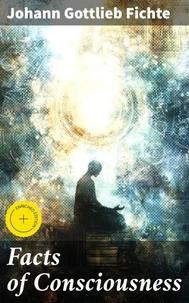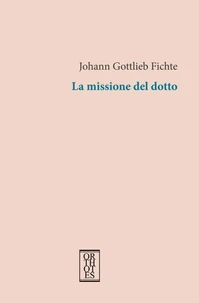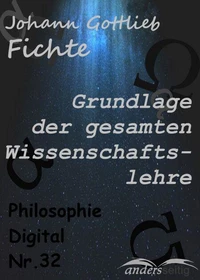Facts of Consciousness
Par : ,Formats :
Disponible dans votre compte client Decitre ou Furet du Nord dès validation de votre commande. Le format ePub est :
- Compatible avec une lecture sur My Vivlio (smartphone, tablette, ordinateur)
- Compatible avec une lecture sur liseuses Vivlio
- Pour les liseuses autres que Vivlio, vous devez utiliser le logiciel Adobe Digital Edition. Non compatible avec la lecture sur les liseuses Kindle, Remarkable et Sony
 , qui est-ce ?
, qui est-ce ?Notre partenaire de plateforme de lecture numérique où vous retrouverez l'ensemble de vos ebooks gratuitement
Pour en savoir plus sur nos ebooks, consultez notre aide en ligne ici
- Nombre de pages133
- FormatePub
- ISBN859-65--4716560-6
- EAN8596547165606
- Date de parution10/08/2022
- Protection num.Digital Watermarking
- Taille496 Ko
- Infos supplémentairesepub
- ÉditeurDIGICAT
Résumé
In "Facts of Consciousness, " Johann Gottlieb Fichte presents a pivotal exploration of self-awareness and the nature of consciousness that significantly influenced the development of German idealism. Written in the early 19th century, the book employs a rigorous, philosophical style characterized by dialectical reasoning and introspective inquiry. Fichte probes deeply into the processes of thought, subjectivity, and the role of the self in constructing knowledge, often challenging prevailing empiricist notions and emphasizing the significance of the individual's active engagement with their own consciousness.
Fichte, a prominent philosopher of the Enlightenment, was greatly influenced by the ideas of Immanuel Kant, particularly the critical examination of the faculties of human understanding. His commitment to the principles of freedom and autonomy stems from his own experiences and the socio-political upheavals of his time, motivating him to seek a philosophical grounding for personal agency within a collective context.
This backdrop informed Fichte's conviction that human consciousness is not a passive receiver of sensations but an active participant in the formation of knowledge and reality. "Facts of Consciousness" is a must-read for anyone intrigued by philosophical discourses surrounding self and consciousness. It offers profound insights into the nature of individual perception and serves as a crucial text for understanding the evolution of modern philosophical thought.
Whether you are a philosopher, student, or avid reader of intellectual history, Fichte's work will enrich your comprehension of the self and its relation to the world.
Fichte, a prominent philosopher of the Enlightenment, was greatly influenced by the ideas of Immanuel Kant, particularly the critical examination of the faculties of human understanding. His commitment to the principles of freedom and autonomy stems from his own experiences and the socio-political upheavals of his time, motivating him to seek a philosophical grounding for personal agency within a collective context.
This backdrop informed Fichte's conviction that human consciousness is not a passive receiver of sensations but an active participant in the formation of knowledge and reality. "Facts of Consciousness" is a must-read for anyone intrigued by philosophical discourses surrounding self and consciousness. It offers profound insights into the nature of individual perception and serves as a crucial text for understanding the evolution of modern philosophical thought.
Whether you are a philosopher, student, or avid reader of intellectual history, Fichte's work will enrich your comprehension of the self and its relation to the world.
In "Facts of Consciousness, " Johann Gottlieb Fichte presents a pivotal exploration of self-awareness and the nature of consciousness that significantly influenced the development of German idealism. Written in the early 19th century, the book employs a rigorous, philosophical style characterized by dialectical reasoning and introspective inquiry. Fichte probes deeply into the processes of thought, subjectivity, and the role of the self in constructing knowledge, often challenging prevailing empiricist notions and emphasizing the significance of the individual's active engagement with their own consciousness.
Fichte, a prominent philosopher of the Enlightenment, was greatly influenced by the ideas of Immanuel Kant, particularly the critical examination of the faculties of human understanding. His commitment to the principles of freedom and autonomy stems from his own experiences and the socio-political upheavals of his time, motivating him to seek a philosophical grounding for personal agency within a collective context.
This backdrop informed Fichte's conviction that human consciousness is not a passive receiver of sensations but an active participant in the formation of knowledge and reality. "Facts of Consciousness" is a must-read for anyone intrigued by philosophical discourses surrounding self and consciousness. It offers profound insights into the nature of individual perception and serves as a crucial text for understanding the evolution of modern philosophical thought.
Whether you are a philosopher, student, or avid reader of intellectual history, Fichte's work will enrich your comprehension of the self and its relation to the world.
Fichte, a prominent philosopher of the Enlightenment, was greatly influenced by the ideas of Immanuel Kant, particularly the critical examination of the faculties of human understanding. His commitment to the principles of freedom and autonomy stems from his own experiences and the socio-political upheavals of his time, motivating him to seek a philosophical grounding for personal agency within a collective context.
This backdrop informed Fichte's conviction that human consciousness is not a passive receiver of sensations but an active participant in the formation of knowledge and reality. "Facts of Consciousness" is a must-read for anyone intrigued by philosophical discourses surrounding self and consciousness. It offers profound insights into the nature of individual perception and serves as a crucial text for understanding the evolution of modern philosophical thought.
Whether you are a philosopher, student, or avid reader of intellectual history, Fichte's work will enrich your comprehension of the self and its relation to the world.













